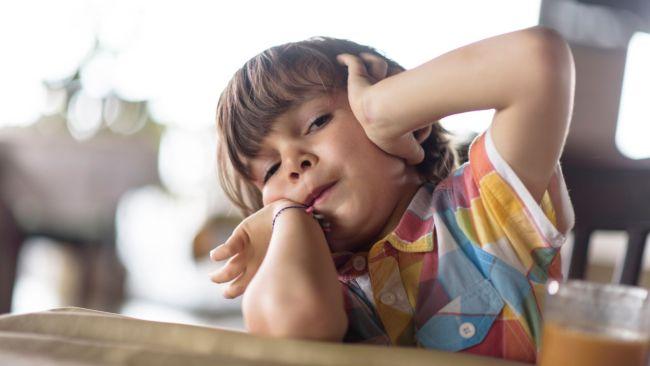Is it ADHD? How to spot the tell-tale signs in your child
Dr Sam Hay explains what parents need to look out for and the crucial steps that follow.
Primary School
Don't miss out on the headlines from Primary School. Followed categories will be added to My News.
There’s a general feeling that more and more kids are being diagnosed with ADHD. People comment that it's a trendy diagnosis, and parents need to control their kids more. We’re drugging a whole generation.
But there’s a lot more to it than that. Let me explain...
What is ADHD?
Attention deficit hyperactivity disorder (ADHD), is a neurodevelopmental disorder, that is characterised by kids who can’t focus, and act impulsively.
In kids with ADHD, the brain’s wiring doesn’t form as well as it could, meaning all the different parts don’t ‘talk’ to each other effectively. When that happens, there are effects on the way kids think, communicate, process information, learn, and control their behaviour.
We don’t really know exactly what causes ADHD, but we do know it’s not bad parenting - first myth busted! It runs in families, so genetics definitely play a part.
It is estimated up to one in fifteen young Aussie kids suffer from ADHD, which means every classroom has one or two affected. Whilst it’s more common in boys, girls are definitely affected - myth number two busted!
Want to join the family? Sign up to our Kidspot newsletter for more stories like this.

What are the symptoms of ADHD?
Symptoms of ADHD arise in early childhood, but it’s not until starting school that they tend to have a functional impact on kids.
The major symptoms are:
- Inattention. Kids have difficulty keeping focus and concentrating. Kids forget instructions, and jump quickly from one task to the next.
- Impulsivity. Kids act before they think. They lose control of their emotions easily, talk over the top of everyone, and are accident-prone.
- Hyperactivity. Kids are constantly fidgeting and restlessness.
But that’s every kid!?! It has certainly been all three of mine from time to time - which is normal.
What sets kids with ADHD apart is that they experience these symptoms all the time, and they have a constant impact on how they function day-to-day. It affects their learning, their ability to keep friendships, and it disrupts the entire household.
Inattentive ADHD
Some children have all the focus, distraction, and attention issues, but without the hyperactivity.
How is ADHD diagnosed?
The next myth that needs busting is the widely held belief that ADHD is being overdiagnosed as the ‘trendy’ diagnosis. It's not - we are just getting better at understanding the condition and seeking help earlier. The experts are also much better at diagnosing ADHD at its mildest form: which will alter the stats, but ultimately bring better care for kids earlier, benefiting their development in the long run.
Diagnosing ADHD isn’t easy. But it’s important for teachers and parents to identify the signs early, seek assessment, and consider therapies earlier rather than later.
Speak to your GP. After issues are raised for kids, the first step is to speak to your GP. They’ll help you coordinate a team around you, whose ultimate goal is to accurately identify symptoms, consider exactly which conditions may be at play, determine severity, then structure a management plan.
See a psychologist. Generally, you’ll need a psychologist who will assist with providing practical support for your child, and parenting support for you. But they definitely assist in making the overall diagnosis.
Consult a specialist. A paediatrician or psychiatrist will also be needed to confirm a diagnosis and consider the role for specific therapies, including medications.
The paediatrician/psychiatrist will conduct a full assessment of development and the current difficulties experienced in your child. They’ll need to gather info from parents, teachers, and from the kids themselves - what their take is on the whole problem. There’s no simple one-stop shop test; it involves a clinical assessment, but questionnaires completed by the family and teachers are useful to supplement and assist.
Importantly, we need to understand that there is often a lot more going on than just ADHD. Many kids develop secondary problems with low mood or anxiety that will need concurrent consideration and therapy.
Dr Sam Hay explains how to approach an ADHD diagnosis for your child on Mum Club podcast. Listen and subscribe wherever you get your podcasts so you never miss an episode and listen to Sam's advice below.
What treatments are available for ADHD?
There is a range of treatment options for ADHD, and the overall plan depends a lot on severity, plus what else is going on in your child’s life causing issues for them. Evidence also shows that involving the kids in the choice of management increases success dramatically.
As a GP I’m big on promoting a solid foundation of care for everyone before we start using medications. We need to arm the kids, their families, and their teachers with a base of essential practical skills and strategies to combat all issues in the mix. Punishment-driven strategies are useless – reward kids for their successes.
- Education and understanding. Ensure everyone in the family understands what’s going on.
- Effective cognitive and behavioural support. Psychologists have a vital role to play for all kids, and may be the only therapy needed for many. They can help build effective strategies for all issues a child may be struggling with.
- Promote calm good quality parenting.
- Promote calm good quality teaching. Whilst the family psychologist and medical team can back brief schools, I’m a firm believer that schools need to take the bulk of responsibility for providing support in the classroom.
- Address specific learning needs. Some kids with ADHD will need additional therapy from specialised allied health practitioners such as speech or occupational therapists to address underlying speech, learning, reading, or writing challenges.
RELATED: Is ADHD ruining my child’s friendships?

Medications in ADHD
Of course parents should be concerned about using medications! It’s a natural fear, but evidence and guidelines point to the overwhelming success of medications in managing ADHD. Plus, they’re some of the most heavily researched medications used for kids and are not addictive in the doses prescribed for ADHD – another myth busted.
Medications have been used since the 70s, and they work around 75% of the time, assisting kids to focus and complete tasks that are not of high interest to them.
Stimulant medication. The two most common medications used in Australia are methylphenidate and dexamphetamine, with around 2% of Aussie kids currently prescribed them. Both have similar actions and side effects, and they can be long-acting (last about 12 hours) or short-acting (last about 3 hours). They act on neurotransmitters in the brain-boosting dopamine levels, which helps dampen the impulsive and hyperactive behaviours seen in ADHD.
They are currently heavily regulated, which is why your GP can’t prescribe them, and you need a paediatrician or psychiatrist in the mix – so it’s essential to book in to see one early (especially when waiting times have blown out after COVID).
Many kids only require their tablets on school days, having weekend and school holiday breaks from dosing. Many kids also require trials of each type of medication at different doses to confirm which regime is best for them. Doses are gradually adjusted every month or so until their benefit is maximised, or ceased if no clear benefit is found.
Non-stimulant medications. There are some non-stimulant medications available which are useful for some kids, especially those who have side effects with the stimulant medications.
Side effects. The most common side effect of ADHD medication is a loss of appetite leading to poor weight gain. Whilst this can be managed for many kids, if severe it can exhaust their energy, impact on physical development and play, plus reduce their learning capacity. Other side effects include:
- Poor sleep
- Emotional changes – irritability, anxiety, or low mood
- Headache
- Stomach pains, nausea, and vomiting
- Dry mouth
- Increased blood pressure and a racing pulse
- Rarely, more significant effects may occur such as hallucinations or psychosis
Long-term consequence of stimulant medications
Inevitable questions from parents embarking on the medication journey for their kids are: can you take them long term, and what are the risks?
Many kids continue using stimulant medications for many many years, often into adulthood. Any decision to continue therapy will draw on many factors - ultimately whether they are providing a clear benefit, and whether there’s an ongoing need. Some kids simply transition into roles in life where their ADHD has little impact; or they've developed enough strategies - a firm foundation - to cope without medications and thrive regardless.
Thankfully current evidence is reassuring: decades of research indicates there are no major negative health effects from taking stimulant medications for a long time.
Substance abuse. It’s a myth that the use of stimulant medications leads to issues with addictions later in life. In fact, it's been suggested they may even be protective.
Growth. Overall data is inconsistent, with minimal to no effects on growth long term the current conclusion.
RELATED: ‘My son’s symptoms of ADHD disappeared with a TV detox’
Alternative therapies for ADHD
There are numerous alternative therapies that gain a lot of attention, but unfortunately, there is little evidence to back up their effectiveness.
Diet and food additives. There is little evidence that certain foods, especially additives, cause or make ADHD worse. On the whole, it is not recommended to manipulate diets and eliminate certain foods or additives, as for the majority of kids it won’t make a difference. Some kids may note positive changes in their behaviour on an elimination diet, but it’s recommended to seek guidance from an expert dietitian. Dietitians plan elimination, then reintroduction of specific foods to accurately identify culprits, plus ensure there is adequate nutritional intake at all times.
Coloured glasses vision training. Unproven.
Fish Oil supplements. Some studies have found that kids with ADHD have low levels of fatty acids in their blood. However, there is very little evidence that boosting these levels with fish oil supplements has any benefit at all.
Video game therapy. Fun, but unproven.
Exercise. It’s imperative that kids with ADHD maintain an active life, with evidence that there is an improvement in core ADHD symptoms, improving cognitive function and medication effects.
Trigeminal Nerve stimulation. The trigeminal nerve runs from the brain through the face, and it has been postulated that stimulating it will effect the parts of the brain linked to ADHD. It’s not recommended as there is no supporting evidence.
A diagnosis of ADHD has the potential to be devastating for kids, and soul-destroying for families. I’m a firm believer that schools need to provide close support in the classroom - especially considering how common a condition it is. For families, seek assistance from your GP, who can coordinate foundation support with a psychologist, and specialist review with a paediatrician/psychiatrist.
And do this early - because waiting times for allied health and specialist services are very long. Get your name down early - you can always cancel if issues settle.
If you're concerned about your child's behaviour, please speak to your local GP for advice.
More Coverage
Originally published as Is it ADHD? How to spot the tell-tale signs in your child





